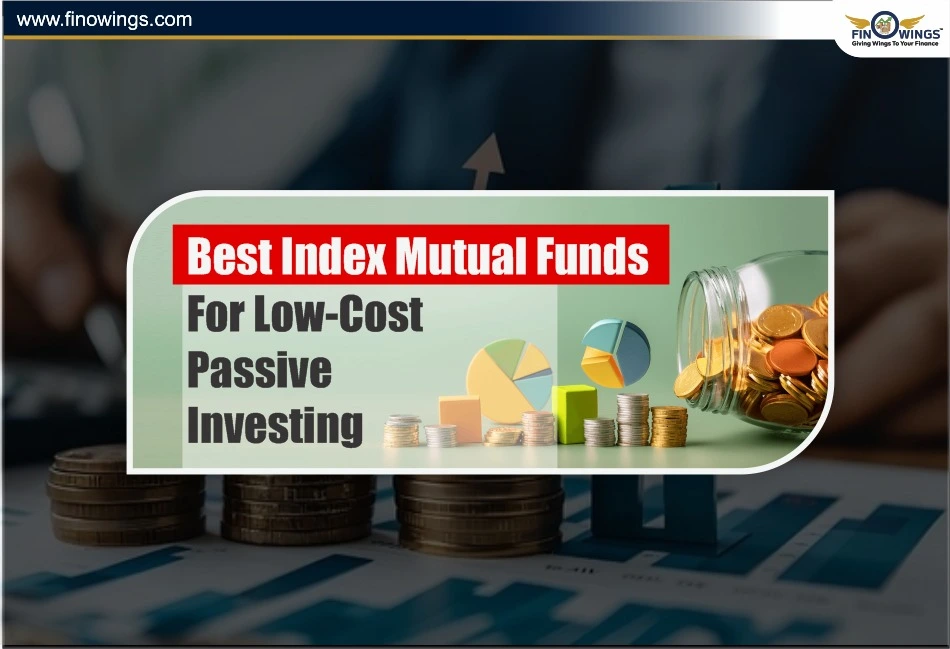Home >> Blog >> Best Index Mutual Funds for Low-Cost Passive Investing
Best Index Mutual Funds for Low-Cost Passive Investing

Table of Contents
If you want to invest in the market in a simple and cheap way, then index funds are one of the best options for you. Index funds are passively managed, meaning you don’t try to pick stocks. Instead, index funds match a collection of stocks that make up a market index. In this post, we will cover what index mutual funds are, why it is important to understand the low-cost options, how to find the best index funds to invest in, and why low-cost index funds benefit long-term investors.
What are Index Mutual Funds?
An index fund is a mutual fund that attempts to replicate the make up and performance of a market index, e.g., Nifty 50 or the BSE Sensex. These funds are less expensive because they don’t include active stock selection, meaning they are simpler and usually have lower fees.
In India, when people say, “index mutual funds” they usually mean funds that track the Indian equity indices.
Why Passive Investing with Index Funds Works
1. Low Cost
Passive investment strategies like index funds cost less because there are no resources spent on actively managing the portfolio. These savings lead to higher net returns over the years.
2. Broad Diversification
Investing in index funds means buying every stock of the index you are tracking in your portfolio. This allows you to reduce risk because you are less dependent on the performance of any one stock.
3. Simplicity & Transparency
The index fund strategy offers a simple and public alignment with the index data. There is no dependency on a fund manager.
4. Market-Level Returns
Unlike actively traded funds that attempt to consistently outperform the market, with index funds you accept market returns. This allows you to avoid the underperformance trap.
What Makes the “Best Index Funds”?
Here are the most important things to look at when selecting index mutual funds:
Expense Ratio: A small expense ratio is better because a fund with a tiny expense ratio will leave more of your returns uncharged.
Tracking Error: This shows how closely the fund follows the index. If the difference is small, it means the fund is closely tracking the index.
Fund Size & AUM: A big fund is usually more liquid and also more stable.
Index Profile: Select one tracking an index you believe in. This can be large-cap, mid-cap, total market, and so on.
Fund House Reputation: Choose a mutual fund provider that has good history and governance.
When thinking about investing in an index fund, consider looking at the expense ratio and the tracking error.
Best Index Funds to Invest In
Here are some themes to consider if you're looking for top index funds:-
-
If you're searching for the best index funds, keep in mind these themes even though the names of the individual funds may change:
-
Follow a large-cap index fund for the Nifty 50.
-
Monitor a blue-chip index fund for the Sensex.
-
Keep an eye on an index fund that reflects the entire market index (wide equity exposure).
-
Pick a fund with an ultra-low expense ratio (direct plans).
-
Pick a fund that has shown consistent tracking and a good AUM.
|
Fund Name |
Expense Ratio |
5-Yr CAGR |
|
UTI Nifty 50 Index Fund – Direct |
~0.17% |
~22.7% (5-yr) |
|
HDFC Nifty 50 Index Fund – Direct |
~0.20% |
~22.7% (5-yr) |
|
ICICI Prudential Nifty 50 Index Fund – Direct |
~0.19% |
~22.7% (5-yr) |
|
Bandhan Nifty 50 Index Fund – Direct |
~0.10% |
~22.8% (5-yr) |
|
Motilal Oswal Nifty 500 Index Fund – Direct |
~0.17% |
~15.4% (5-yr) |
In India e.g some index funds track benchmark indices and have expense ratios around 0.30% and have been delivering competitive returns over the last 3 to 5 years.
How to Use Index Funds in Your Portfolio
1. Long Term Horizon: Over 5-10 years, index funds are better suited for long-term investing, and not for quick trades.
2. SIP: Regularly investing through a Systematic Investment Plan (SIP) can help to average out the cost and reduce the risk of market timing.
3. Minimise Costs: Use the direct plan, opt for the lowest expense ratio, and don’t switch funds frequently.
4. Stay Invested During Volatility: The broad market will fluctuate, and that is perfectly normal.
5. Combine with Other Strategies: Index funds can be your foundation, and you can include some actively managed funds for balance.
Common Missteps with Index Funds
-
Picking funds based on recent performance (keep in mind: they follow the market).
-
Not taking tracking error, and other costs into account.
-
Niche investing in a specific index without examining the sector risks.
-
Constantly switching funds, which adds costs and undermines the benefits of passive investing.
Importance of Low Cost Index Funds
Investment experts point out that low-cost index funds work best when the expense account is minimised, most of the market growth is captured by the investor, which is a win for the investor.
Conclusion
Index mutual funds should be a staple in your portfolio. If you need a straightforward, efficient, and hands-off approach to investing in equities, these funds need to be included. Because of their low cost, wide market exposure, and steady performance (compliant with the benchmark), they are ideal for long-term investors.
After selecting a fund and examining its index profile, tracking error, and expense ratio, you will have an investment vehicle that satisfies your primary investing requirements while you focus on other objectives and goals in your life.
Investing in inexpensive index funds is still one of the finest choices available today if your goal is steady wealth growth and you wish to avoid the dangers and expensive mistakes of active funds.
Debt funds use fixed-income instruments to provide stability, much like equity-based index funds give passive stock market exposure. Discover how to balance your portfolio with safer, consistent-return investments by reading our comprehensive article on Top Performing Debt Mutual Funds.
DISCLAIMER: This blog is NOT any buy or sell recommendation. No investment or trading advice is given. The content is purely for educational and information purposes only. Always consult your eligible financial advisor for investment-related decisions.
Author
Frequently Asked Questions
An Index Mutual Fund is a type of mutual fund that tracks a specific market index like the Nifty 50 or Sensex. It aims to replicate the index’s performance by investing in the same stocks in the same proportion.
Index funds have lower expense ratios because they are passively managed. There’s no need for active research or stock picking, which reduces management costs and increases long-term returns.
Some of the top index mutual funds in India include UTI Nifty 50 Index Fund, HDFC Nifty 50 Index Fund, ICICI Prudential Nifty 50 Index Fund, and Motilal Oswal Nifty 500 Index Fund. These funds have low expense ratios and consistent performance.
Yes. Index mutual funds are ideal for long-term investors because they deliver market-level returns with minimal costs. Over time, compounding and lower fees make them efficient wealth-building tools.
You can invest in index funds through SIPs (Systematic Investment Plans) or lump-sum investments via mutual fund platforms, AMC websites, or brokers. Always compare expense ratios, AUM, and tracking errors before investing.



















